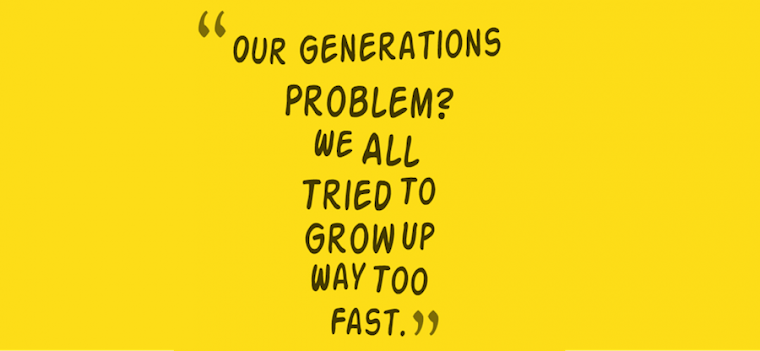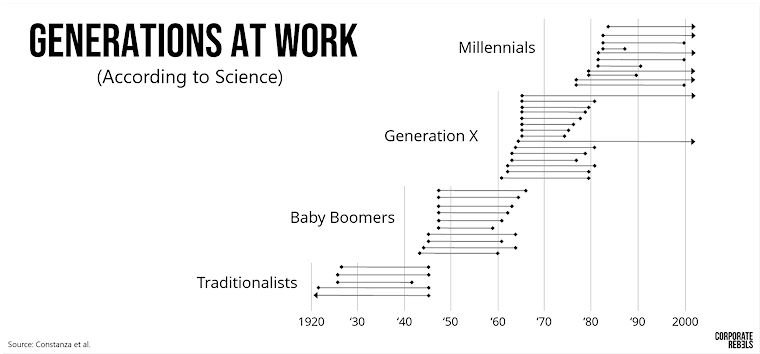Generations At Work: Persistent Myths Vs. Actual Science

In an article for Forbes Magazine, we busted the persistent myth that different generations have different needs and desires at work.

Back then we were talking about popular-press articles claiming that, for example, Traditionalists are believed to be conservative, Baby Boomers materialistic, Generation Xers individualistic, and Millenials socially conscious, cynical and narcissistic.
In our article we argued, based on our experience with clients, and some common-sense reasoning, that those generalizations are nonsense, and largely ill founded.
However, we are not the only people arguing this. We are in good company. Science agrees with us.
The Science
It is surprisingly hard to find proper, peer-reviewed research on ‘generations at work’. It's so much easier to find articles and videos filled with poor assumptions and awful reasoning - like the one on "Millennials in the workplace" from Simon Sinek that went viral last year.
After some digging, we found a literature review done by David Constanza and colleagues. In their meta-analysis, ‘Generational differences in work-related attitudes’, they reviewed decades of studies across four generations:
- The Traditionals,
- The Baby Boomers,
- The Generation Xers,
- And the Millennials.
What is a meta-analysis?
A meta-analysis is a statistical process for combining data from multiple studies. If the results are consistent from one to the next, meta-analysis can validate this. And when the results from one study to the next vary, meta-analysis may identify why.
We will spare you reading the meta-analysis yourself. We have done that. Here are the 3 major flaws they uncovered:
1. There are no clear definitions of the different generations
The fundamental flaw is the definitions related to ‘generations at work’. What is the definition of a generation? That’s the first question Constanza and his co-workers tried to answer.
They found a generation is a group of similarly aged people who experience common historical events. For such events, think about the Depression, World War II and the Civil Rights movement.
The general idea is that if people are influenced by historical events and other phenomena that occur during the key development stages of their life, these will have an impact on the attitudes, values and characteristics of other people within their generation.
If this was true, it could be of great value. Generational membership then would become a convenient proxy for the characteristics of huge groups of individuals.
The problem, however, is that in their meta-analysis Constanza and colleagues found different researchers had used different time frames for each generation. In other words, there was (and still is) little agreement on the birth year ranges that define the generations. The figure below represents the range of years used by various researchers.

2. There is little empirical research
The second flaw is even more alarming. Just as we couldn’t find much research on ‘generations at work’, Constanza and co-workers discovered there are very few academic studies on the subject.
After reviewing decades of research, they found only 20 studies that provided enough evidence to be used in their meta-analysis. This small number of studies is remarkable—given the wide coverage and broad claims made in mainstream media and popular management literature.
With so little research on the topic, the empirical support for claims in the popular press on generational differences (at work) is far from convincing.
3. The little research done doesn't show differences between generations
But it gets worse. The last flaw is definitely not the least. The results from the meta-analyses showed the relationship between generational membership and work-related outcomes is essentially zero—in almost all cases.
There was little or no support for differences between groups based on generational membership. In other words, the findings suggest meaningful differences among generations do not exist!
What are the practical implications?
More and more organizations are designing programs, interventions and strategies based on the ‘generations at work’ myth. This is an effort to motivate employees of different generations, or to win the war on talent.
However, the meta-analysis suggests we be seriously sceptical of those strategies. Adopting ‘special’ ways of working, to address the needs of different ‘generations at work’, may not be effective at all.
In summary, the researchers show that those popular ‘generations at work’ claims are probably bullshit. Organizations should take them with a grain of salt.
A truckload of salt!


